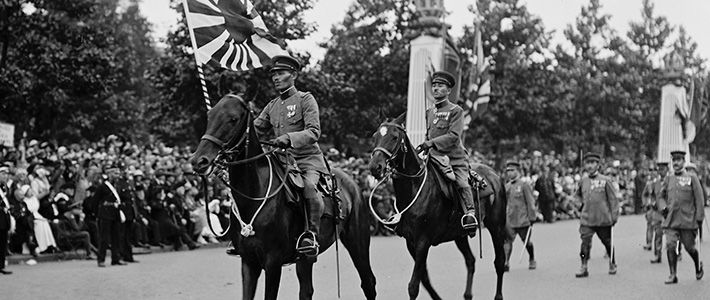
The Lessons of World War I and Twenty-first Century International Relations
Society- English
- 日本語
- 简体字
- 繁體字
- Français
- Español
- العربية
- Русский
Recently, there has been considerable discussion both in the academic world and the media concerning Japan and World War I. This has focused particularly on the reasons for and background to the outbreak of the war and similarities with current relations in East Asia. However, there has been very little consideration of what lessons Japanese politicians, military officers, and commentators of the time learned from World War I as a whole, how they assessed the war, and what kind of future Japan they pictured based on the outcome of the conflict. From this perspective, I would like to present a few of their opinions here.
Japan stood at a major crossroads after World War I from the standpoint of its international relations and its place in the world. Debate mainly centered on whether it should remain in a cooperative relationship with its ally Britain or seek a new path. Strangely, some commentators presented arguments opposing Britain and the United States, while glorifying wartime enemy Germany as a model of success.
Praise of German Militarism
For example, in the October 1920 issue of Ajia Jiron (Asia Review), the journalist Chikushi Jirō downplayed the importance of German defeat, taking its general mobilization system as a model and advocating its popular mobilization-based “virtuous militarism.” German militarism was widely seen to be the major cause of the outbreak of the war and was severely criticized internationally both during and after the conflict. However, Chikushi believed in the “stab-in-the-back legend”(*1) then popular in Germany and supported the German model, insisting that the country had been forced into surrender by some politicians and revolutionary elements even though it had not been defeated militarily.
Similarly, Ugaki Kazushige (1868–1956), who later served as army minister and then foreign minister, wrote in his diary that “Germany did not lose the war” and promoted the effectiveness of the German model. Even Mizuno Hironori (1875–1945), a military officer who would later become a pacifist, defended German militarism immediately after the war in the magazine Chūō Kōron (Central Review).
“After Germany’s surrender, many self-proclaimed prophets of inevitable German defeat came forward. At the same time, a whirlwind of voices opposing militarism swept across the nation, while the militarists of the time spoke in hushed tones. . . . When considering Germany’s defeat, however, I am more and more ready to accept the necessity of militarism. . . . If we wish Japan to become a stronger state in the future, we must have the wisdom to learn from Germany’s strong points.” (Chūō Kōron; August 1, 1919)
Taishō Democracy’s Rejection of Militarism
However, there were also many commentators who thought that Japan should distance itself from Germany, which it had used as a model since the Meiji era (1868–1912), and that the lesson of the war was that it was essential to abandon militarism. Yoshino Sakuzō (1878-1933), a central figure in the liberal blooming known as “Taishō Democracy,” warned that as Japan had been on the Allied side in the war, alongside Britain, the United States, and France, if it did not also join these democracies in its ideological outlook, it would be isolated internationally. Religious scholar and philosopher Anesaki Masaharu (1873–1949) had also criticized Japan’s enthusiasm for imitating Germany before the war in Chūō Kōron (April 1, 1902) and blasted German militarism as “poison” during and after the war, as in his 1919 book Sekai bunmei no shin kigen (A New Era for World Civilization).
In his essay “Gunkoku shugi o hihan su” (A Critique of Militarism), linguist Honma Hisao (1886–1981) denounced the close relationship between militarism and patriotism in the Japan of the time, pointing out the inappropriateness of using narrow patriotism in education.
“I must consider the patriotism in our government-designated school textbooks, or at least the militarism-based patriotism, to be most unfortunate. I wish to say that militarism is . . . feudalistic. I absolutely cannot believe in today’s patriotism, a feudal variety founded on an egotistical, selfish, and narrow nationalism, which holds that if one’s own country is fine, it does not matter at all what happens to other countries.” (Chūō Kōron; July 1, 1922)
After World War I, Yoshino Sakuzō and others who supported Taishō Democracy, and called for a break from feudalistic, aggressive German-style militarism and patriotism, gained the upper hand and Japan became a peaceful nation through the 1920s. However, this democracy and pacifism faced opposition.
Japanese society around that time began to glorify militarism again, and the Japanese government eventually chose the path leading to a new war. Perhaps, like Germany and other European countries, it did not consider sufficiently the lessons of World War I. It seems to me that when thinking about what we can learn from World War I in the present era, we need to consider not only the outbreak of the war, which recently receives so much attention, but also the lessons drawn from the war after its end.
(Originally written in Japanese on August 22, 2014. Banner Photo: Japanese officers at The Great Victory March held in London on July 19, 1919. © TopFoto/Aflo.)
(*1) ^ When asked the cause of defeat in World War I by a 1919 committee of inquiry, Paul von Hindenburg (1847–1934), chief of the German General Staff during the second half of the war, stated that it had been a “stab in the back.”